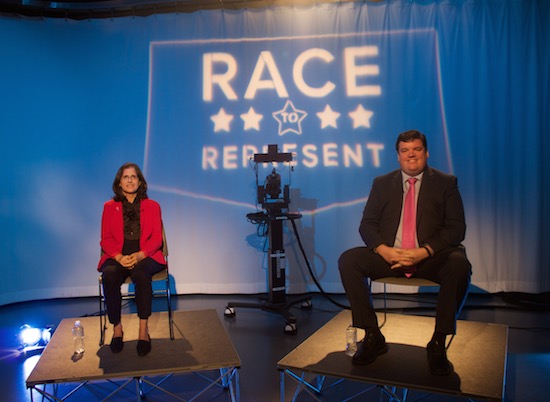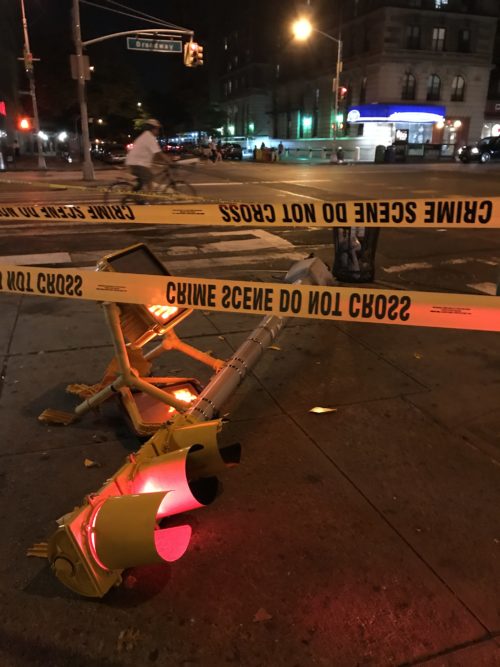By Carol Tannenhauser
Two candidates for a City Council seat covering much of the Upper West Side debated issues ranging from housing to the Museum of Natural History expansion project at a Tuesday forum that will soon be shown on television. The debate was held at the studios of Manhattan Neighborhood Network (MNN), on West 59th Street between 10th and 11th Avenues.
Current Council member Helen Rosenthal and challenger William Raudenbush, an Independent, actually agreed relatively often during the debate, a shift in tone from the hard-fought Democratic primary that Rosenthal won last month.
Both, for example, are very concerned about developers building on what Rosenthal called “soft spots” — “places where one could build without any regulatory restrictions, except that the building be put up safely,” she explained.
The 668-foot mega tower planned for 200 Amsterdam Avenue has become a flashpoint for this issue. Rosenthal signed onto a zoning challenge to stop it, initiated by Olive Freud, of the Committee for Environmentally Sound Development , with whom Raudenbush worked.
“Sixty-one stories is completely out of context for our district,” Rosenthal said. “We cannot let that building go up and be precedent setting for other developers who want to build on the Upper West Side. The challenge that the community put forward had to do with the zoning being a mish-mosh and misinterpretation of ‘open space.’ The Department of Buildings has lifted the hold on the project, but they still have not fully explained why they think the project meets the zoning requirements. That’s disappointing and I’m not stopping the fight against it. I continue to be in dialogue with the Department of Buildings and City Hall. I believe it’s unacceptable.”
Here’s what Raudenbush had to say:
https://www.youtube.com/watch?v=VKLkH-PF-O8
Things were not as amiable when it came to the question of expanding the Museum of Natural History, a central issue in the acrimonious Democratic Primary, in which Rosenthal soundly beat Mel Wymore and Dr. Cary Goodman, both anti-expansionists, as is Raudenbush.
“If you want to put a mini Times Square right in the heart of what I think is a real sweet spot on the Upper West Side, there should be a lot more discussion about what kind of crowds and traffic you’re going to have,” he said. “I think this is the issue where Helen and I differ the most, because, really, it comes down to process. Our elected officials essentially told this neighborhood that this was a done deal on day one.”
Raudenbush called the findings of the Draft Environmental Impact Statement (DEIS) issued by the Parks Department, “frankly false,” and said, “Community United to Protect Theodore Roosevelt Park, which is the organization I’m involved with, wants to get a better deal for the neighborhood from the museum. Although it’s a cherished cultural institution, we really don’t think it’s appropriate to put hundreds of thousands, even, millions of people on that side of the park without a lot more planning and a lot bigger benefit to the park.”
Rosenthal said she supports both – the expansion and the need for further study. “I’m really excited about this project, as I’ve made clear,” she said, “but I am also worried about the congestion issues, as I’ve made clear since 2015, and it’s something I’ve continued to hold the museum’s and the Department of Transportation’s feet to the fire on, and we’re continuing those discussions. I do think it’s an exaggeration to say millions of people will be walking into this new 79th street entrance. We have to be careful to talk about the information accurately in order to make sure we’re dealing with the problem in the right way.”
The topic of affordable housing also led to a spirited back and forth.
“Seniors in the district have to wait, on average, five to seven years to get housing they can afford,” Rosenthal said. “It’s a serious problem. My focus now is to preserve the affordable housing we have. I have seniors coming into my office every day. They are the most vulnerable residents who landlords who are unscrupulous target to free up units for market-rate housing. That’s why I’m so proud that I passed legislation to create an office for the Tenant Advocate, and, in my second term, I’m absolutely determined to make that office meaningful, and make sure it enforces the 13 laws the Council passed to keep people in their homes.”
“Of the 13 laws passed, I have to say, the Tenant Advocate was the only one criticized,” Raudenbush responded. “It’s a bit of a redundancy. I don’t think it’s the worst thing in the world, but I don’t think it has much meaning.”
“The only people who are complaining about it are those at the Department of Buildings who are going to have to change the way they do things now,” Rosenthal rebutted. “I haven’t heard any complaints. I’ve only heard from tenants who support this plan.”
From there the exchanges became amicable again.
Alluding to the fact that, if the elections go as expected, only 12 of the 51 members of the City Council will be women, Rosenthal closed with a vow, “as co-chair of the Women’s Caucus, to absolutely keep any new Speaker’s feet to the fire to make sure there are more women in leadership positions, and that women are properly represented and have their voices heard in the City Council.”
“Having women in government is very important,” Raudenbush said, “and I’m very proud of the Upper West Side for having a female City Council member since 1993. We’re certainly a progressive district and that shines through.
“I would ask the Council Member,” he said in closing, “ to have more debates, keep the discussion going, so we can engage the community and really get that vote total up. Only 25% of those eligible voted in the Primary. I’d like to see that rise to 50%. Let’s really be a leader.”
The debate covered a wide range of topics. Rosenthal made it clear, for instance, how she feels about the city giving any more money to the MTA to help mitigate the subway crisis. Here’s what she had to say:
https://www.youtube.com/watch?v=4UaYACOSXW4
Race to Represent District 6 Debate airs on 10/15 starting @ 7pm.
MNN1 (In Manhattan: TWC 34 & 1995, RCN 82, FiOS 33) and on MNN 5 HD Community Channel available on Time Warner Cable Channel 1993. The program can also be streamed live online at www.mnn.org.
The election is on November 7.
Editor’s Note: We want to touch base with Independent David Owens and presumptive Republican candidate Hyman Drusin, both of whom have said they’re running for the seat, but can’t seem to get in touch with them. If you know them, have them write to us at westsiderag at gmail dot com.









As a reference point this is the context that 200 Amsterdam is being built in, just between 65th and 72th St.
145 West 67th Street – 49 floors
171 West 65th Street – 60 floors
220 Riverside Boulevard – 49 floors
101 West 67th Street – 46 floors
200 Amsterdam Avenue – 55 floors
200 Riverside Boulevard – 46 floors
150 Amsterdam Avenue – 42 floors
180 Riverside Boulevard – 40 floors
201 West 70th Street – 42 floors
Maybe the street life killing, Robert Moses-built super block with acres of suburban style parking lots at Lincoln Towers is the real out of context development?
Re: “Maybe the street life killing, Robert Moses-built super block with acres of suburban style parking lots at Lincoln Towers….”
Oh, how Jane Jacobs (“The Death and Life of Great American Cities”) of you to condemn Lincoln Towers as a “super block”.
HOWEVER, Ms. Jacobs’ book was published in 1961, when the Lincoln Towers “super block” was still in the earliest stages of construction.
It’s rather hard to imagine the developers (NOT Robert Moses!) saying “Oh, my goodness! We must stop building, for we are offending Jane Jacobs”.
As for “street life killing”: If you had EVER spent five minutes in Lincoln Towers you would have seen the constant parade of:
1. residents walking between Amsterdam and West End,
2. or the numbers of residents sitting and “schmoozing” on its numerous outdoor benches,
3. or the numbers of dog owners walking their pets.
Oh, yes, SOME residents DO own cars (GASP!) and some of those are financially-able enough (GASP-GASP!!) to park in the quite-pricey (GASP-GASP-GASP!!!) parking spots. How shameful…how retrograde.
But thanks to your comment they will now hide their faces when they retrieve or park their un-trendy CAR in its un-trendy SUBURBAN-LIKE parking spot.
AND, someday, when the uber-socially-conscious regime gains power, it will certainly send these un-trendy car-owners to state-run re-education camps…probably in The Gulag.
So thanks, Comrade, for making us aware of our un-trendy life style.
Hi Scooter Stan. I live nearby Lincoln Towers, and am always dismayed by the signs telling me that my child is not welcome in Lincoln Towers playground and my dog is not welcome to walk on Lincoln Towers grounds. It’d be nice if the community were a little more inclusive of its neighbors.
Re: “…my child is not welcome in Lincoln Towers playground and my dog is not welcome to walk on Lincoln Towers grounds.”
Hmmmm…have you tried bringing your dog to the playground and your child to the L.T. grounds? That might solve the problem.
Just kidding…sorta 👻
What does this even mean?? You didn’t answer the question. And…and I think that was a joke or something but I’m not quite sure. Please advise.
The area has been high rise for a long time and much of it before 1980.
https://www.nycissues.org/Development.aspx
Large residential areas of the UWS have no street level retail space at all. The urban renewal projects of the 50’s and 60’s have left the UWS with a legacy of bad urban design. Many small business spaces were removed from the street landscape creating the shortages of this important resource.
Both of them are lousy and have nothing productive to say.
They both want to make the UWS “affordable” but at the same time are against new construction in the neighborhood.
I’m not sure how to make housing affordable if you want to limit the supply of housing.
I’m confused about what other readers think is affordable housing in this area. So many posters have trashed seniors with rent controlled apartment, as well as the existing low income (poor door) housing ‘projects,’ and any lottery that is posted in this forum. I work full time 6 days a week and two thirds of my salary goes to rent so I’ve also been told that I can’t ‘afford,’ to live here and should to another borough (which doesn’t really apply anymore), even when I’m paying my own way and not using any type of assistance. Seriously, what do UWSers consider affordable?
20-25% of your annual salary is the most you should be paying in rent IMHO. If you are paying 2/3 to rent then you best be looking for a more affordable apartment.
If 2/3 of your salary goes towards rent then maybe you should get a smaller apartment, take in a roommate or consider The Bronx and Staten Island.
I live in a one room walkup, can’t get any smaller. Unless the bathroom is considered a 2nd room, lol.
over 30% of gross paid for rent or housing costs (mortagegs, etc) is considered “housing cost burdened?”. more than half of NYErs suffer from the fate.
let’s be clear that this is not the natural state of affairs, and further does not stem from rent stabilization. further, it is not the individual’s “fault” and they should not be lectured to “get a smaller apartment.”
Sherman’s statement above — “take a roommate or move” — is basically “if there is no bread, let them eat cake.” but it is the attitude of the big developers and the real estate industry.
it is appalling that an adult has to work 6 days a week, i assume at a decent job, just to make ends meet in the most modest way. To advocate that they spend 2.5 – 4 more hours a day commuting — in many cases, it is more — and to force them to do so is an attack on the living standards of working class and middle class people.
Sammie, same for my coworkers and I. A few of us live in Manhattan and 2/3 of our salary goes to rent, and the others live in the Bronx, Queens and Brooklyn, and don’t pay quite as much (up to $200 less) but they have to commute at all hours, plus the cost. So whatever works out for you personally.
Why? Just why is it important, much less “very important” to have women in government?
What about simply striving for having the most qualified, competent, able and otherwise fit people, regardless of sex, in government? Shouldn’t that and not sex, race or other identity Pokemon points, be the ultimate, if not sole, criterion for public office?
Also, just why is increasing voter turnout considered desirable, per se? And would Mr. Raudenbush still say (or at least think) that it were desirable if he were to ever become convinced that a majority of those who presently do not vote would vote against him?
A representative government can benefit from viewpoints that reflect its constituents’ diverse perspectives. Women make up 50% of the constituents.
Many women, including a majority of married women, voted for D.J. Trump last November. Apparently, they felt that he represented their views more than their “fellow female” H. Rodham-Clinton*. In the same election, I, a man, voted for Wendy Long, a woman, for Senate. I did so because I felt that she came considerably closer to representing my views than my “fellow male” Charles Schumer did. Likewise, for the State Senate race in my district, I voted for Melinda Crump, another woman. In neither case did the respective sexes of the candidates factor into my decision.
(*Or Jill Stein, for those women in states where she was on the ballot and were familiar with her.)
I happen to be an Ashkenazic Jew. The Irish Catholic Patrick J. Buchanan, however, comes far closer to representing my ideal Presidential candidate than any fellow Jew I can think of. And Supreme Court Justice Clarence Thomas is an example of someone in government who represents my views to a far greater degree than many whites, Jew or Gentile, do.
For an office that were limited to foreign policy, I could see myself supporting someone such as journalist Glenn Greenwald over someone whose sexual identity/interest/lifestyle/philosophy and/or other areas of social/cultural philosophy and views were far more agreeable to my own.
In all of the above examples, I am far from alone; it is not at all uncommon for the candidate that closest represents a given constituent’s views to be of the opposite sex and/or of a different race, ethnicity or even a different religion or lifestyle, etc. In finding the type of identity politics represented by the quote from the article that I was responding-to reprehensible and repugnant, I would also be far from alone.
Pat Buchanan?? Pat Buchanan represents the interests of Jews??? more than a Jew would???
OMG! Now I know you are just trolling us. Good one. You almost got me.:)
What I meant is that Pat Buchanan has been accused of Antisemitism throughout his entire career…for decades! Everyone knows that!!! Go educate yourself. Jeez!!!! You are really something.
There is a whole section in his Wikipedia bio titled “Charges of Antisemitism and Holocaust Denial”!!!!!!
The Anti-Defamation League (have you heard of them??) called him an “unrepentant bigot”
Some of the most conservative figures throughout the years have repudiated him. William F. Buckley to Charles Krauthammer. You really know how to pick’em. Your relatives and ancestors are very proud I’m sure. Pat Buchanan??!?!
What I wrote was “comes far closer to representing my ideal Presidential candidate“. By “ideal Presidential candidate” I meant the individual whom I believe, if elected, would, on the whole, best represent the interests of this country, the United States of America. (That I do not believe that Mr. Buchanan would harm or endanger Jews should go without saying. I realize, though, that may be difficult for you to believe, for I am well aware of how he has been portrayed and is viewed by many.)
It may surprise you to learn that I believe that it is imperative for Jews to remain distinct, steadfast and even insular in our unique religious observance, including marrying only among ourselves and educating our young in Judaic parochial schools. When it comes to involvement in politics and civic affairs, however, I absolutely reject the idea of pursuing our own parochial interests and concerns to the exclusion of or with disregard to the broader interests and concerns of the larger, general communities and country that we live in.
In retrospect, both of the middle two paragraphs of my original post would probably have been better omitted. They drifted too far afield from the original topic of this thread, while probably not being essential or even necessary to the critical point I was trying to make. Ironically, your post would seem to serve as an example of the very kind of identity politics based thinking that I have been repudiating.